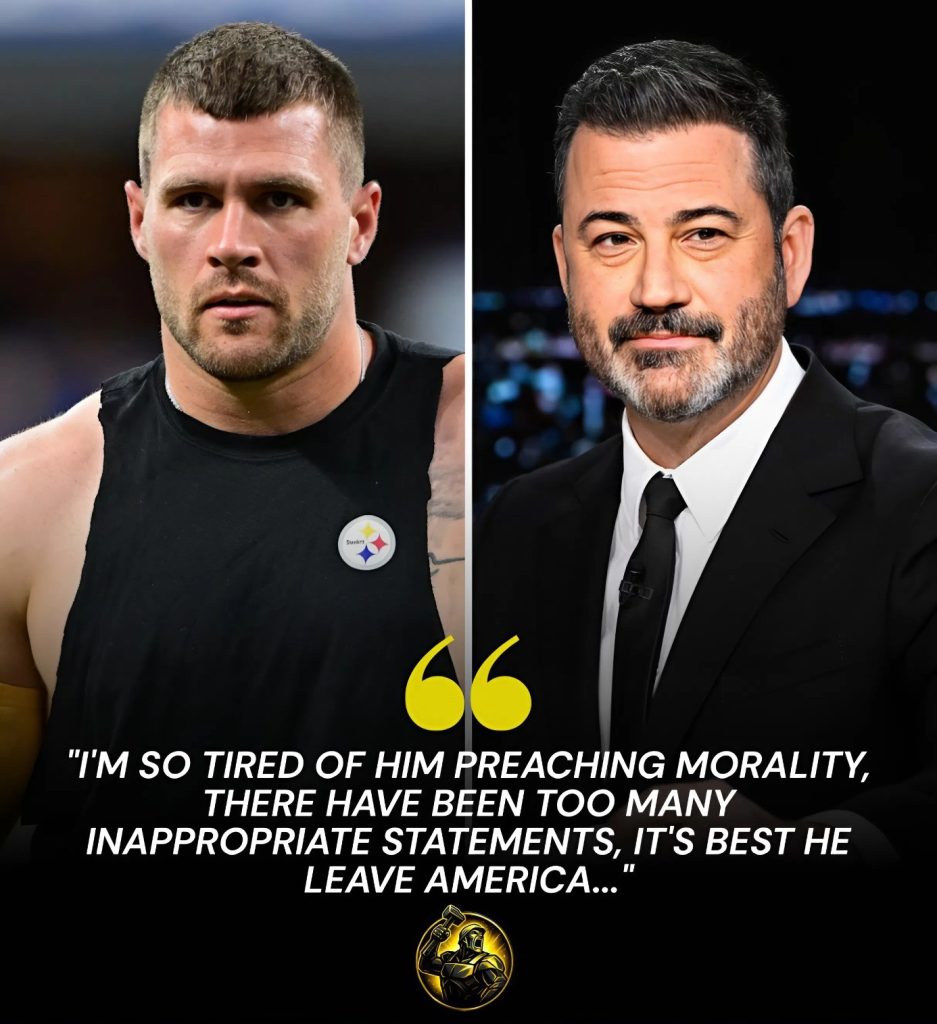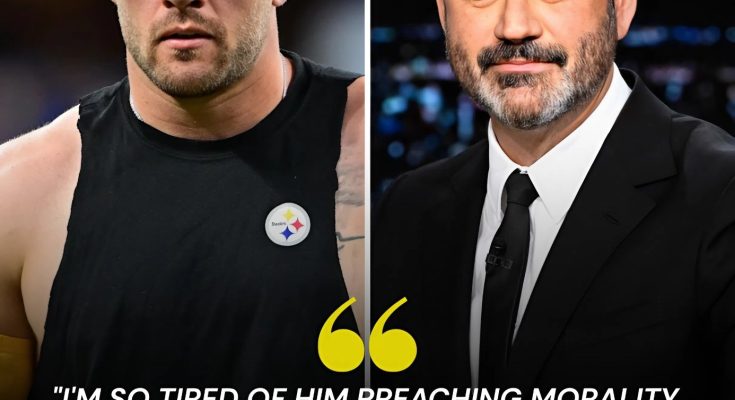
The wave of controversy surrounding late-night host Jimmy Kimmel has reached new heights, and now it has crossed directly into the world of the NFL. After Kimmel’s inappropriate comments about those commemorating political commentator Charlie Kirk, backlash has been relentless across the media. But just as the debate was beginning to stabilize, Pittsburgh Steelers superstar T. J. Watt reignited the firestorm with blunt words that left no room for interpretation. In a recent interview, Watt declared: “He has crossed the line. With such offensive words, Jimmy Kimmel should leave America. We don’t need a fake ‘bad boy’ on television.”

For NFL fans, Watt’s comments hit like a thunderbolt. Known for his leadership, intensity, and reputation as one of the league’s most respected defenders, Watt rarely steps into political or cultural debates. When he does speak, people listen. His strong condemnation of Kimmel has now put the NFL squarely in the center of an already boiling controversy, creating a collision between sports, politics, and entertainment that shows no sign of slowing down.
Kimmel’s remarks, which mocked groups honoring Charlie Kirk, were widely criticized as insensitive and divisive. The backlash quickly spread, with government restrictions temporarily suspending his ability to engage directly with American audiences. For many, the suspension was a warning shot; for others, it was overdue accountability. But for Watt, suspension was not enough. His words suggested that Kimmel’s entire presence in American media is toxic, and that the country deserves better than the kind of behavior the comedian has displayed.
The reaction to Watt’s statement was immediate and explosive. Steelers fans applauded their star for speaking with courage, calling him a voice of reason in a moment when they felt mainstream entertainment had gone too far. Social media platforms lit up with hashtags like #TJWattTruth and #KimmelOut, showing just how quickly his comments resonated across football communities and beyond. Supporters praised Watt for standing tall, not just as an athlete, but as someone unafraid to defend values he believes in.
But not everyone agreed. Critics accused Watt of stepping outside his lane, arguing that a football star should not be dictating who belongs in America or not. Entertainment journalists warned that his comments risked polarizing fans, especially given that the NFL has worked hard in recent years to keep the focus on football rather than politics. Others suggested that while Watt’s words reflected genuine frustration, they could also spark unnecessary distractions for the Steelers as the season unfolds.
Inside the Steelers organization, the response has been careful but supportive. Team officials have not attempted to distance themselves from Watt’s comments, instead framing him as an individual entitled to his opinion. Head coach Mike Tomlin, when asked about the issue, said only that the team remains “focused on football,” though he did not deny that Watt’s leadership carries significant influence in the locker room and beyond.

Meanwhile, the NFL itself has yet to release an official response. League insiders, however, are reportedly monitoring the situation closely. In the past, when players have made politically charged comments, the league has tried to remain neutral, avoiding direct involvement unless those remarks create direct violations of policy. With Watt being one of the NFL’s most marketable stars, officials may tread carefully, wary of alienating fans on either side of the cultural divide.
What makes this story particularly explosive is the rare overlap of celebrity controversy with professional sports. Jimmy Kimmel has always thrived on pushing boundaries, often brushing aside criticism as part of his comedic persona. But when one of the NFL’s biggest defensive stars publicly tells him to “leave America,” the conversation shifts from comedy to something much more serious. It suggests that the line between entertainment and sports is thinner than ever, and that cultural controversies can spill into arenas where fans least expect them.
As the debate rages on, attention now turns to both Kimmel and Watt. Will Kimmel respond directly to Watt’s remarks, potentially escalating the conflict further? Will the NFL or the Steelers attempt to manage the fallout, or will they let Watt’s words stand as his own? And perhaps most importantly, will fans ultimately side with the veteran pass rusher’s unapologetic stance, or push back against what they see as an overreach?
For now, one thing is clear: the storm surrounding Jimmy Kimmel has not only failed to subside but has grown more intense thanks to T. J. Watt’s unfiltered comments. What started as a controversy in the entertainment industry has now become a flashpoint in professional sports, proving once again that no arena is immune from the cultural battles shaping America today.
As the Steelers prepare for their next game and the Eagles’ clash with the Rams approaches, the NFL finds itself in unfamiliar territory. With Watt’s words echoing across headlines and Kimmel’s future uncertain, the stage is set for one of the most unexpected and divisive off-field sagas of the 2025 season.


